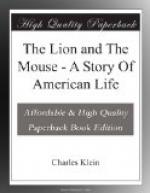Jefferson had read half a dozen reviews of it in as many American papers that afternoon at the New York Herald’s reading room in the Avenue de l’Opera, and he chuckled with glee as he thought how accurately this young woman had described his father. The book had been published under the pseudonym “Shirley Green,” and he alone had been admitted into the secret of authorship. The critics all conceded that it was the book of the year, and that it portrayed with a pitiless pen the personality of the biggest figure in the commercial life of America. “Although,” wrote one reviewer, “the leading character in the book is given another name, there can be no doubt that the author intended to give to the world a vivid pen portrait of John Burkett Ryder. She has succeeded in presenting a remarkable character-study of the most remarkable man of his time.”
He was particularly pleased with the reviews, not only for Miss Rossmore’s sake, but also because his own vanity was gratified. Had he not collaborated on the book to the extent of acquainting the author with details of his father’s life, and his characteristics, which no outsider could possibly have learned? There had been no disloyalty to his father in doing this. Jefferson admired his father’s smartness, if he could not approve his methods. He did not consider the book an attack on his father, but rather a powerfully written pen picture of an extraordinary man.
Jefferson had met Shirley Rossmore two years before at a meeting of the Schiller Society, a pseudo-literary organization gotten up by a lot of old fogies for no useful purpose, and at whose monthly meetings the poet who gave the society its name was probably the last person to be discussed. He had gone out of curiosity, anxious to take in all the freak shows New York had to offer, and he had been introduced to a tall girl with a pale, thoughtful face and firm mouth. She was a writer, Miss Rossmore told him, and this was her first visit also to the evening receptions of the Schiller Society. Half apologetically she added that it was likely to be her last, for, frankly, she was bored to death. But she explained that she had to go to these affairs, as she found them




